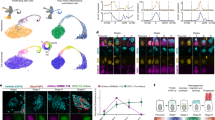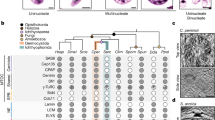Abstract
As a general rule, ciliated protozoans reproduce asexually by transverse binary fission. Suctoria, however, characteristically produce unequal endogenous buds which develop into migratory ciliated larval forms. Endogenous budding has not been reported in the remaining subclasses of the Ciliatea. Observations made by Kent suggest that one member of the Hypotrichida has a larval stage in its life-cycle1. He observed the development of an embryonic hypotrich, which closely resembled Glaucoma margaritaceum Ehr., into Aspidisca costata Ehr. In the same treatise Kent considers the holotrich genera Glaucoma and Microthorax to be embryonic or transitional phases in the life-cycles of higher hypotrichous forms. No other reference to such life-cycles in the Hypotrichida have been found.
This is a preview of subscription content, access via your institution
Access options
Subscribe to this journal
Receive 51 print issues and online access
$199.00 per year
only $3.90 per issue
Buy this article
- Purchase on Springer Link
- Instant access to full article PDF
Prices may be subject to local taxes which are calculated during checkout
Similar content being viewed by others
References
Kent, W. S., A Manual of the Infusoria, 794 (David Bogue, London, 1880–1882).
Author information
Authors and Affiliations
Rights and permissions
About this article
Cite this article
CURDS, C. Endogenous Bud Formation in the Hypotrichida. Nature 208, 90–91 (1965). https://doi.org/10.1038/208090b0
Published:
Issue Date:
DOI: https://doi.org/10.1038/208090b0
Comments
By submitting a comment you agree to abide by our Terms and Community Guidelines. If you find something abusive or that does not comply with our terms or guidelines please flag it as inappropriate.



